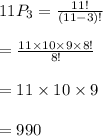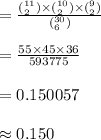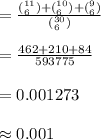
Mathematics, 23.06.2020 17:01 jboii11
A friend of mine is giving a dinner party. His current wine supply includes 11 bottles of zinfandel, 10 of merlot, and 9 of cabernet (he only drinks red wine), all from different wineries.(a) If he wants to serve 3 bottles of zinfandel and serving order is important, how many ways are there to do this?(b) If 6 bottles of wine are to be randomly selected from the 30 for serving, how many ways are there to do this?(c) If 6 bottles are randomly selected, how many ways are there to obtain two bottles of each variety?(d) If 6 bottles are randomly selected, what is the probability that this results in two bottles of each variety being chosen? (Round your answer to three decimal places.)(e) If 6 bottles are randomly selected, what is the probability that all of them are the same variety? (Round your answer to three decimal places.)

Answers: 1


Another question on Mathematics

Mathematics, 21.06.2019 13:00
What is the equation of the graph that represents f(x)=x^4 stretched vertically by 2 and shifted up 3 spaces
Answers: 1

Mathematics, 21.06.2019 18:10
The means and mean absolute deviations of the individual times of members on two 4x400-meter relay track teams are shown in the table below. means and mean absolute deviations of individual times of members of 4x400-meter relay track teams team a team b mean 59.32 s 59.1 s mean absolute deviation 1.5 s 245 what percent of team b's mean absolute deviation is the difference in the means? 9% 15% 25% 65%
Answers: 2

Mathematics, 21.06.2019 19:20
1- is the product of two rational numbers irrational or rational? first, make a hypothesis by multiplying two rational numbers. then, use variables such as x=a/b and y=c/d and the closure property of integers to prove your hypothesis. 2- what do you think the product of a nonzero rational number and an irrational number is? is it rational or irrational? make use of variables, the closure property of integers, and possibly a proof by contradiction to prove your hypothesis. 3- why do we have to specify that the rational number must be nonzero when we determine what the product of a nonzero rational number and an irrational number is? if the rational number were 0, would it give us the same result we found in part b?
Answers: 3

Mathematics, 21.06.2019 20:30
25) 56(1) = 5b a. identity property of addition b. identity property of multiplication c. commutative property of multiplication d. commutative property of addition
Answers: 1
You know the right answer?
A friend of mine is giving a dinner party. His current wine supply includes 11 bottles of zinfandel,...
Questions

Mathematics, 17.10.2019 02:50


Chemistry, 17.10.2019 02:50

Mathematics, 17.10.2019 02:50

Mathematics, 17.10.2019 02:50




Health, 17.10.2019 02:50

Biology, 17.10.2019 02:50

Physics, 17.10.2019 02:50

Mathematics, 17.10.2019 02:50



English, 17.10.2019 02:50


Social Studies, 17.10.2019 02:50

Mathematics, 17.10.2019 02:50




 ways
ways ways
ways ways
ways






